The first panel of the 5th European Parliament of Persons with Disabilities discussed the right to enjoy all the benefits of being a citizen of the European Union, especially freedom of movement (working and living in another EU country) and exercising political rights.
Humberto Insolera, our Executive Committee member, and MEP Salvatore Da Meo, chair of the European Parliament’s Constitutional Affairs Committee, moderated the panel. Panellists included Věra Jourová, Vice President of the European Commission for Values and Transparency; Emilly O’Reilly, European Ombudsman; Karine Lalieux, Belgian Minister of Pensions and Social Integration; Alistair Gaetano represented Julia Farrugia Portelli, Maltese Minister for Inclusion, Voluntary Organisations and Consumer Rights; and Martin Conway, member of the Irish Senate. Nineteen participants took the floor.
The main conclusions included:
- The European Disability Card is an essential initiative to expand freedom of movement, an initiative that needs the close involvement of organisations of persons with disabilities. However, it must be supported by funding and specific measures to support persons with disabilities in moving to another country.
- Authorities and political parties need to support persons with disabilities in getting involved in politics – from participating in political meetings to working as elected officials.
- Political decision-makers have an integral role to play in ensuring persons with disabilities can enjoy their rights.
- National and local authorities need to involve persons with disabilities – and their representative organisations – when developing any measure that impacts public life.
Panellists intervention
MEP Salvatore da Meo opened the debate by stating that everyone needs to be able to enjoy their rights.
He highlighted the right to political participation and the barriers that stop persons with disabilities from participating in political life. He said that Members of the European Parliament have a duty to advance the rights of persons with disabilities:
We have to construct a future in which the political participation has neither physical nor cultural barriers.
He pointed to initiatives such as reforming the EU’s electoral law and the European Disability Card, which can foster European citizenship.
European Commission Vice President for Values and Transparency Věra Jourová started by underscoring participation in the European elections of 2024:
Persons with disabilities must fully enjoy their right to vote and run as candidates on an equal basis with others. As the clock is ticking towards the next elections, the Commission is working hard also in cooperation with the European Parliament to make sure EU institutions play their role in promoting disability-inclusive and accessible elections next year.
She shared EU legislative initiatives that intend to push EU countries to create more accessible election processes: the “Defence of democracy package” and the EU mobile citizens directive.
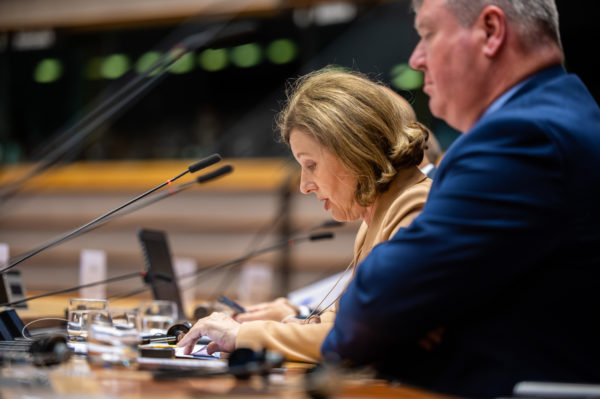
She informed participants that the European Commission is preparing a guide on good electoral practices to improve the participation of citizens with disabilities. The guide will provide direction to EU countries – national governments, national authorities involved in election processes and other regional and local authorities. It will be published by the end of 2023. Additional guidance supporting the goal of increasing participation in public life includes a recommendation on inclusive electoral processes and civic engagement.
Vice-President Jourová further discussed plans to support independent living, including EU funding and guidelines and recommendations to Member States on the transition to community-based living and a framework of excellence of social services for persons with disabilities.
She concluded by speaking about initiatives on accessibility: the AccessibleEU Resource Centre, which is already active, and the upcoming expansion of the European Disability Card.
European Ombudsman, Emily O’Reilly, explained her role in supporting people that face issues with the EU administration. This role includes ensuring EU citizens can fully participate in EU decision-making processes, such as consultations and events:
A strong democracy does not go to sleep between visits to the ballot boxes.
The Ombudsman outlined her efforts on independent living, specifically a 2022’s inquiry which showed that some Member States continued using EU funds to prolong the use of residential institutions. She called for funding under the Resilience facility to correct these mistakes and to include representative organisations of persons with disabilities in bodies monitoring EU Funds.
The Ombudsman spoke about the EU Institutions as employers of persons with disabilities: “The EU is itself an employer and has, therefore, a legal and moral obligation to provide good conditions to all their employees.” Her office created a guide of good practices on accommodating employees with disabilities, called on the European Commission to revise the rules governing health insurance for civil servants and incentivise the recruitment processes to become more accessible.
“The European Union still has a distance to go to ensure the full inclusion and participation of persons with disabilities, but through dialogue, reflection and continued vigilance, I believe we can get there.”
The Belgian Minister of Pensions and Social Integration, Karine Lalieux, presented a national perspective:
Free circulation of people is central to the European model, and it is vital for everybody to be able to benefit from it.
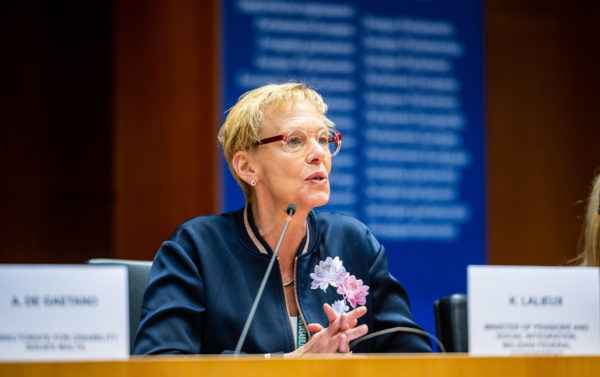
She highlighted the urgent need for the European Disability Card, which will also be helpful as a tool for raising awareness.
However, the Card by itself will not remove all the obstacles. Minister Lalieux spoke about the need for additional measures to promote access, anti-discrimination and guarantee fundamental rights: “It is our responsibility as political decision-makers to ensure that all citizens are included.”
The Minister repeatedly stressed the need for persons with disabilities, and their representative organisations, to be involved in political decision-making. She promised that the upcoming Belgian Presidency of the EU will advance disability rights in close consultation with disability activists.
Mr Alistair Gaetano, representing the Maltese government and Maltese Minister for Inclusion, Voluntary Organisations and Consumer Rights Julia Farrugia Portelli, presented another national perspective.
Mr Gaetano shared Malta’s solidarity with the delegation of Ukraine and spoke about Malta’s efforts towards disability rights. It includes the creation of a platform to involve organisations of persons with disabilities called ENGAGE. “One of the things our minister always mentions is that she acknowledges the facts of “Nothing about us without us”.
If we do have disability policy, it should be by disabled people for disabled people.
Mr Gaetano announced an initiative that was developed with ENGAGE – draft legislation to ban forced sterilisation of persons with disabilities (a demand from the European Disability movement).
Malta was one of the countries that piloted the European Disability Card, and Mr Gaetano shared Malta’s full support for its expansion.
Mr Gaetano concluded by sharing legal initiatives to fully comply with the UN Convention on the Rights of Persons with Disabilities: legislation to move away from guardianship systems, transposition of the European Accessibility Act, and going beyond the requirement of the Web Accessibility Directive by funding businesses to ensure their digital presence is accessible.
Member of the Irish Senate Pat Conway closed the panel by sharing his experience as a policymaker with disabilities. He started his speech by expressing his commitment to the European Disability Card:
That type of initiative is strong and will make a difference in terms of free movement.
He went on to discuss the challenges of persons with disabilities participating in politics. He started by speaking about the accessibility of transport and to reach places where political decision-making happens, such as Parliament buildings. He called on institutions to start investigating diversity quotas in politics, similar to gender quotas.
He shared his work as vice chair of the Advisory Panel on political participation of persons with disabilities at the Organisation for Security and Cooperation in Europe. It includes commissioning research to get statistics, facts and figures on political participation and a pilot training on the issue in the Irish Senate.
He urged disability advocates to run for elections “There is no point in being in the outside looking in. Let’s get inside and look out.”
Humberto Insolera summarised the panel by asserting that equal rights in terms of mobility and access are essential, and the European Disability Card is an important symbol to advance them. For that, coordination between all levels of power is needed.
Participation of persons with disabilities in political life was another important topic, by supporting persons with disabilities to vote, to be elected and ensure they are provided reasonable accommodation.
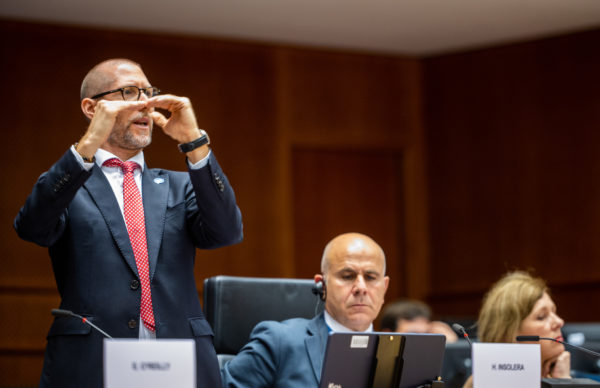
He mapped the vision for the rights of persons with disabilities – working together:
You are here to do politics with us, not for us
Interventions from the floor
After a short break, participants made short interventions from the floor. We highlight the following:
- MEP Dolors Montserrat, Chair of the Committee on Petitions, highlighted the large number of petitions received by the Parliament. Petitions describe cases of discrimination on accessibility and mobility, equal access to public space, education and employment and the rights of women with disabilities. She brought attention to the Committee’s report on the rights of persons with disabilities.
- Antonio Cotura, President of the Italian Disability Forum, highlighted the need to ensure support for children with disabilities from a very early age. He spoke about the situation in Italy and stressed the need to ensure the recovery and resilience plan includes persons with disabilities.
- Dorica Dan, Vice-President of EURORDIS – Rare Diseases Europe, spoke about the misdiagnosis of persons with rare diseases and the lack of recognition of their disability status. This barrier prevents these persons from benefitting from EU initiatives such as the EU Disability Card.
- MEP Jarosław Duda welcomed the EU Disability Card’s initiative. He highlighted barriers to the political participation of persons with disabilities and called on the European Commission and Member States to take steps to solve them.
- John Dolan, Chief Executive Officer of the Disability Federation of Ireland, called on the European Union to fully realise the humanity and capacity of persons with disabilities.
- MEP Rosa Estaràs Ferragut focused on accessibility and ensuring inclusive education. She spoke about two upcoming moments that may promote inclusion at the European level: the European Disability Card and the European Elections. She finished by underlining the issues of women and girls with disabilities.
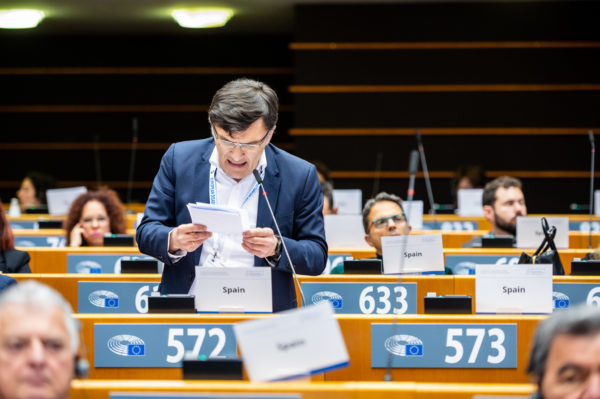
- Alberto Durán Lopez, a member of the Executive Committee of CERMI, started by sharing the demand that the EU Disability Card extends to mutual recognition of disability status. He underlined the need to ensure the right to vote for persons with disabilities, including accessible voting for all. He called for full implementation of the Istanbul Convention.
- MEP Sylwia Spurek focused on the right to vote and political participation of persons with disabilities, a pre-condition to ensure the realisation of persons with disabilities. She added that it’s “vital that women with disabilities be treated with dignity, for example, at the gynaecologist.” – she used the example of a deaf woman who needs to go with her son to the gynaecologist because the son provides sign interpretation for her.
- Florence Jablonski, a representative of the French delegation, shared with the audience the recent decision of the Council of Europe in a complaint from disability organisations against France.
- Vasileios Koutsianos, a representative of the Greek delegation and Secretary-Gneral of the Greek national council for persons with disabilities, lamented the lack of legislation to ensure freedom of movement for persons with disabilities. He said the European Disability Card must function as a “passport” for persons with disabilities to move freely. He finished with a call for “democracy to be inclusive”.
- The Vice-President of the European Union of the Deaf, Ronit Laquerrière-Leven, raised the lack of opportunities to communicate in sign language. She lamented the lack of recognition of national sign languages by the EU, contrary to its international obligations. She asked for a strong regulation for the EU Disability Card, which recognises the communication barriers imposed on Deaf people.
- Amany Shalha, a representative of the Dutch delegation, spoke about her experience as a blind refugee and the gaps that exist when belonging to more than one marginalised group. She highlighted the sky-high unemployment rates of migrants.
- Katarina Strunjak, a representative of the Croatian delegation, stressed the issue of having to prove disability status in every different EU country. She highlighted the main issues for the Croatian delegation: harmonising accessibility policies, digital accessibility, implementation of the Green Deal and availability and affordability of assistive technologies.
- Mateja Toman, President of the Slovenian National Council of Persons with Disabilities, shared that the general situation of persons with disabilities improved, but the gap between legal rights and guaranteed rights is still large. She shared the example of the European Disability Card implementation in Slovenia and how the close involvement of organisations of persons with disabilities is essential for its success.
- MEP Janina Ochojska shared the importance of independent living and her path to the European Parliament as a person with disabilities.
- Jonathan Elebjork Wahlstrom, a representative of the Swedish delegation and member of the EDF’s Youth Committee, highlighted that the core of the European Union is diversity. He addressed the issues of youth with disabilities- accommodations for students with disabilities need to be improved, including during exchange programmes.
- MEP Ciarán Cuffe advocated for more access to public space and increasing accessibility to transport and transport infrastructure.
- Klaus Widl, President of the Austrian Disability Council, called for binding measures on accessibility, with enforcement and control by the European Union. He called for public funding to ensure accessibility in all areas of daily life and for penalties to be levied when standards are not met.
- Francisco Trigueros, President of the European Deafblind Union, stated that accessibility is a key pillar for disability rights and highlighted the specific needs for deafblind people to participate in public life, including the funding and provision of tactile deafblind interpreters.
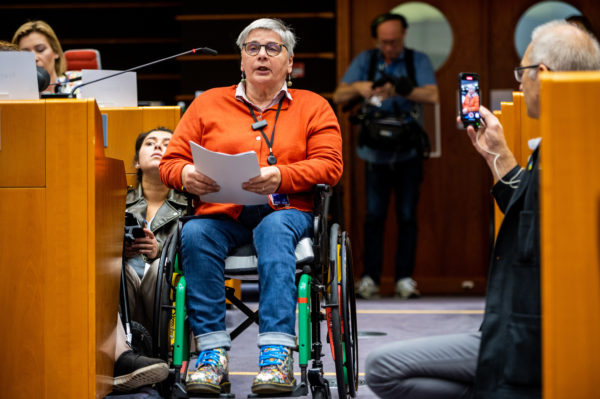
Carolyn Akintola, a member of the Irish delegation, closed the interventions by sharing her most recent example of discrimination – just the day before when travelling to Brussels to attend the event. Ryanair refused to board her wheelchair on the flight to Brussels. Furthermore, the captain announced to passengers that the boarding of the wheelchair passengers caused the delay in departure. She denounced the lack of understanding, decency and compassion from staff when dealing with her situation:
Where was my dignity as a citizen of the European Union, or don’t we matter too?
Answers from the panel
The moderators thanked the participants for the interventions
EU Ombudsman Emily O’Reilly expressed her dismay at Carolyn’s experience and agreed that there is still work to be done in recognising the humanity of persons with disabilities.
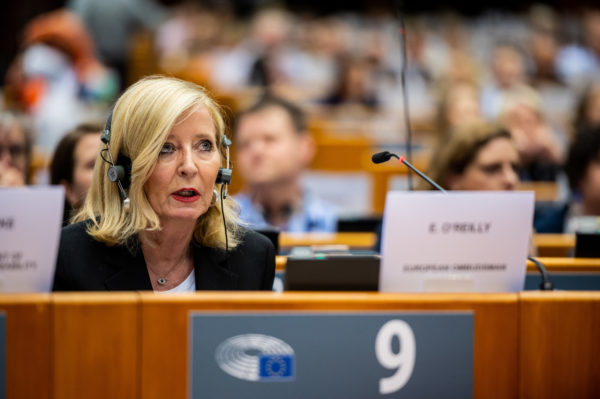
Belgian Minister Karine Lallieux recognised the accessibility problems in Brussels and guaranteed that she will continue her effort to solve them.
Alistair de Gaetano highlighted that persons with disabilities must be involved, and authorities must act on their feedback.
Irish MP Martin Conway shares that Carolyn’s experience is symptomatic of the experiences of persons with disabilities. He highlighted the need for persons with disabilities to be supported as political candidates.
Humberto Insolera closed the session and passed the floor to the President of the European Disability Forum, Yannis Vardakastanis, for the approval of the EDF Manifesto on the European Elections.